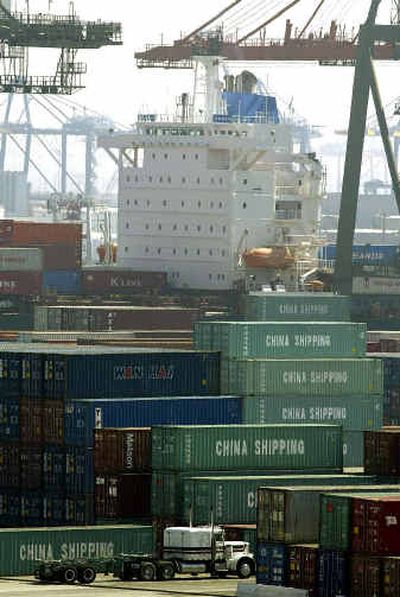Trade deficit at all-time high

WASHINGTON — The United States posted a record trade deficit in March, reflecting Americans’ voracious demand for foreign-made goods as well as the most expensive crude oil since 1983.
The $46 billion deficit reported Wednesday by the Commerce Department represented a hefty 9.1 percent increase from February’s imbalance and came despite the fact that U.S. exports climbed to an all-time high in March.
“The economy is shifting into high gear, and we’re vacuuming up goods from around the world to support that growth,” said Joel Naroff, president of Naroff Economic Advisors.
Imports of goods and services came to a record $140.7 billion in March, representing a 4.6 percent increase from the previous month. The strengthening U.S. economy stoked demand for imports. But the weaker value of the U.S. dollar, which makes imported goods more expensive in the United States, also played a factor in pushing up the total value of imports, said Mark Zandi, chief economist at Economy.com.
Exports, meanwhile, totaled $94.7 billion, also their best month on record. That marked a 2.6 percent advance from February. Exports were helped out by the weaker dollar, which makes U.S. goods cheaper for foreign buyers, and some pickup in overseas economies, economists said.
Even though exports gained ground in March, the yawning trade gap and the loss of U.S. jobs have been hot-button campaign issues that President Bush and presumptive Democratic presidential nominee John Kerry have jousted over.
Bush says the best way to handle the trade deficits is to get other countries to remove trade barriers and open their markets to U.S. businesses. But Kerry points to the deficits as evidence that the president’s free-trade and economic policies aren’t working.
“News of the widening U.S. trade deficit raises more concerns over George Bush’s mismanagement of the economy,” Kerry said. “We need a trade policy that is free, fair and tough.”
In March, imports of automobiles and parts came to $19 billion, a record. Imports of consumer goods, including TVs, toys and clothing, totaled $31.3 billion, also an all-time high.
The United States’ $5.6 billion trade deficit with oil-producing countries, including Saudi Arabia and Venezuela, was the highest on record. The average price of imported crude oil rose to $30.64 a barrel in March, the highest since February 1983, another factor in the swollen trade gap.
U.S. exporters, however, posted gains. Exports of U.S.-made cars and parts totaled $7.2 billion in March, a record. U.S. exports of consumer goods, including pleasure boats and tobacco products, also registered all-time highs in March, as did U.S. sales of industrial supplies.
“This is very good news indeed for manufacturers, who account for 80 percent of all goods exports,” said David Huether, chief economist at the National Association of Manufacturers.
Hardest hit by the 2001 recession, manufacturers, which have seen millions of jobs evaporate, are finally getting back on firmer footing. Over the last three years, they have had to cope not only with hard economic times at home and abroad but have also had to compete with a flood of imports.
America’s politically sensitive deficit with China widened to $10.4 billion in March. But U.S. exports to the country totaled a record $3.4 billion.
U.S. manufacturers contend that China is deliberately undervaluing its currency, the yuan, by as much as 40 percent, giving that country a big trade advantage when competing with U.S. companies.
The Bush administration has been pressing Beijing to stop linking its currency to the dollar and to let the value of the yuan be set in open markets.
Last month, the administration announced that it would not launch unfair trade investigations into China’s currency practices and alleged violations of labor rights — a decision that drew criticism from Democrats and some Republicans in Congress who represent states that have suffered big losses of factory jobs.
March’s big trade gap may mean that the economy’s 4.2 percent growth rate for the first quarter of this year could be lowered, economists said. The government’s second estimate of first-quarter GDP is released on May 27.